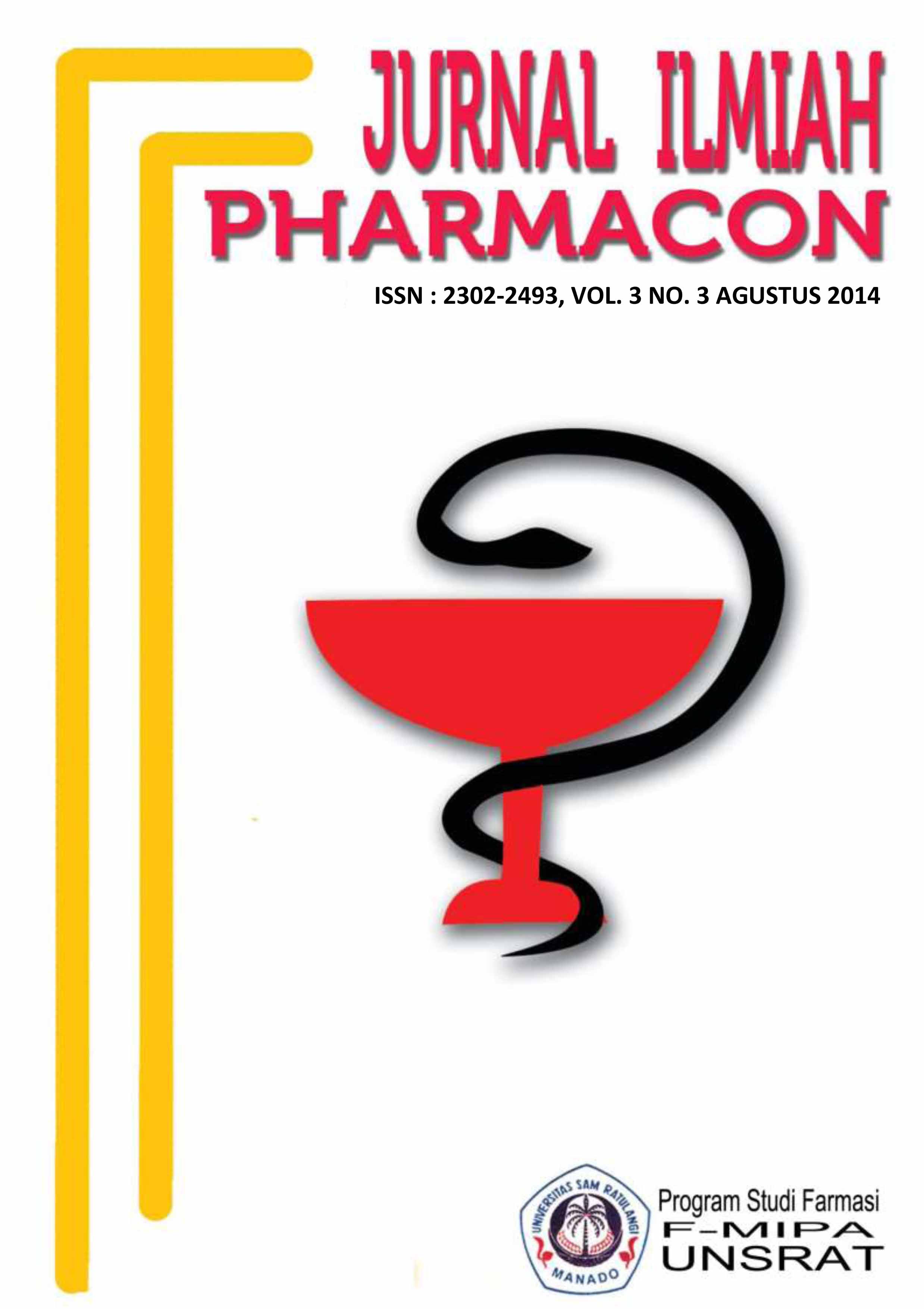POTENSI EKSTRAK ETANOL TANGKAI DAUN TALAS (Colocasia esculenta [L]) SEBAGAI ALTERNATIF OBAT LUKA PADA KULIT KELINCI (Oryctolagus cuniculus)
DOI:
https://doi.org/10.35799/pha.3.2014.5409Abstract
ABSTRACT
Taro (Colocasia esculenta [L]) is a cylindrical shaped plant that has a pseudo stalk and light brown colored bulbs. The heart shaped leaves are elongated and the leaf surfaces are waterproof which presumably can heal wounds . The purpose of this study was to test the ethanol extract of taro leaf stalk as an alternative drug in the skin wounds of rabbits (Oryctolagus cuniculus) and phytochemical screening of compounds which act to cure wounds. Nine rabbits were used as test animals and were divided into 3 groups (treatment A, B, and C). Treatment A: wound was given ± 0.2 g betadine drug (positive control), treatment B: wound was given ± 0.2 g Taro stem extract, treatment C: wound was given no treatment (negative control). The wound was smeared 2 times a day using betadine liquid (positive control) and the wound was smeared 2 times a day by using Taro stem extract. Observations of the injuries were done every day (day 0 to day 9). From the observations, it can be inferred that Taro stem extract has potential as an alternative drug to cuts because it demonstrated wound healing activity on rabbit skin, so the test showed that Taro stems and leaves contain the phytochemical extracts saponins, flavonoids, tannins, alkaloids, steroids and terpenoids.
Â
Key words : Taro Leaf Stem, Rabbit, Cut, Phytochemistry Test
Â
ABSTRAK
Talas (Colocasia esculenta [L]) merupakan tumbuhan yang memiliki tangkai daun yang semu, berbentuk silindris dan memiliki umbi berwarna coklat muda, sedangkan pada bagian daun berbentuk seperti jantung yang memanjang dan permukaan daun yang tahan air (waterproof) yang di duga dapat menyembuhkan luka. Tujuan dari penelitian ini ialah untuk menguji ekstrak etanol tangkai daun Talas sebagai alternatif obat luka pada kulit kelinci (Oryctolagus cuniculus) dan skrining senyawa fitokimia yang berperan sebagai obat luka. Hewan uji yang digunakan sebanyak 9 ekor kelinci yang dibagi menjadi 3 kelompok (perlakuan A, B, dan C). Perlakuan A : luka diberi ± 0,2 g obat betadine (kontrol positif), perlakuan B : luka diberi ± 0,2 g ekstrak tangkai daun Talas, perlakuan C : luka tanpa perlakuan (kontrol negatif). Luka dioles 2 kali sehari dengan menggunakan betadine cair (kontrol positif) dan luka dioles 2 kali sehari dengan menggunakan ekstrak tangkai daun Talas. Pengamatan luka dilakukan setiap hari (hari ke-0 sampai hari ke-9), dari hasil pengamatan disimpulkan ekstrak batang Talas dapat berpotensi sebagai alternatif obat luka sayatan karena telah menunjukkan aktivitas penyembuhan luka pada kulit kelinci, sehingga dilakukan uji fitokimia yang menunjukkan bahwa ekstrak tangkai daun Talas mengandungan saponin, flavonoid, tanin, alkaloid, steroid dan terpenoid.
Â
Kata kunci : Tangkai Daun Talas, Kelinci, Luka, Uji Fitokimia
Downloads
How to Cite
Issue
Section
License
Authors who publish with this journal agree to the following terms:
- Authors retain copyright and grant the journal right of first publication with the work simultaneously licensed under a Creative Commons Attribution-NonCommercial 4.0 International License that allows others to share the work with an acknowledgement of the work's authorship and initial publication in this journal.
- Authors are permitted and encouraged to post their work online (e.g., in institutional repositories or on their website) prior to and during the submission process, as it can lead to productive exchanges, as well as earlier and greater citation of published work (See The Effect of Open Access)










